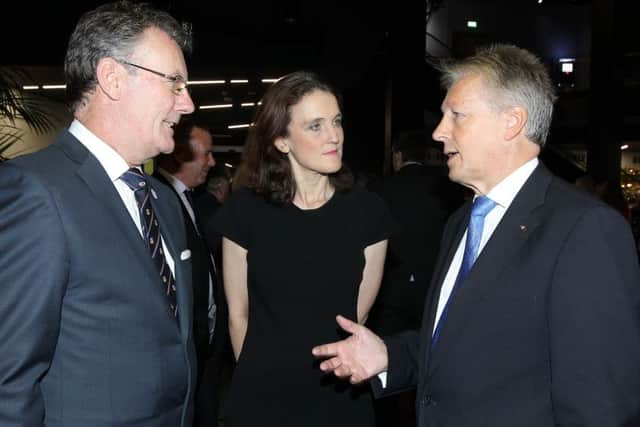Peter Robinson is right '“ it is not defeatist to be prepared


“I see it as containing people of all backgrounds. From those who can trace their ancestry to before the plantation, to those who have lately come to our shores and for whom English was not the language of their birth. The message and purpose would be to persuade and convince those with whom we share this space of the importance and value of the Union.”
A few weeks later, at the DUP’s annual conference, Robinson revisited the issue: “I want us to use our powers of persuasion here at home, where it matters, to expound the benefits of belonging to the Union. That means challenging ourselves as well as others and it means building a society where everyone feels equally valued.
Advertisement
Hide AdAdvertisement
Hide Ad“This generation of unionists, yes, our generation, has the opportunity to reshape politics and guarantee NI’s place in the UK for centuries to come. My goal as leader is to lay the groundwork that will cement our place within the Union. If that means taking tough decisions or abandoning outdated dogmas, then I’ll do it.”


I welcomed both speeches in pieces for the News Letter; and regular readers will know that the need for unionism to think ahead and ‘plan for all eventualities’ is something that I return to time after time.
Robinson made those speeches six years ago. Just six years ago and no-one – and I really do mean no-one – predicted a situation in which the UK would vote to leave the EU; that relations between the UK and Republic would become so fractious; that unionists would lose their overall majority in the Assembly; that devolution would collapse; and that a border poll moved from outside possibility to distinct probability.
But the work that needed to be done by unionists wasn’t done. The Council for the Union wasn’t powered-up. The pro-Union family wasn’t brought together (although we did have the short-lived and increasingly tetchy Unionist Forum for a few months in 2013). There has been no sustained, broad-based campaign to promote the ‘value of the Union’ and deconstruct the arguments of the pro-unity lobby.
Advertisement
Hide AdAdvertisement
Hide AdIn Sammy Wilson’s piece for the News Letter on Saturday he talked about ‘planning to take the fight to the enemy which is what unionists expect from their leaders’.
Actually, I think most unionists would expect their leaders to have long moved past the planning stage and, instead, be fully prepared for once and have a range of options and strategies already in place.
And that’s why I agree with Peter Robinson’s recent comments. I don’t think he is saying prepare for a border poll that leads to Irish unity; I think he is saying that we use the possibility/probability of a border poll to become, individually and collectively, much more pro-active in promoting and protecting the Union. That is not defeatism. That is common sense.
If the DUP had followed through on Robinson’s speeches in 2012 (and, as it happens, I think he lacked the courage of his own convictions and instincts back then and allowed himself to be distracted) then I don’t think unionism would have been as ill-prepared as it is right now; and maybe, just maybe, we would have had options in our out-tray.
Advertisement
Hide AdAdvertisement
Hide AdSammy, Peter and I may not agree on a range of issues, but we are pro-Union. Yes, we differ on how that unionism manifests itself, but we will always be on the same side in the event of a border poll. The pro-Union family is a big, diverse one, embracing six political parties/the loyal orders/fringe groups/community groups/a range of Protestant churches and sects/liberals/ fundamentalists/all social backgrounds and so on and so on. They do not see everything exactly the same way (there is, for example, a huge division on attitude to the EU). They have a multiplicity of voices and positions. They are prone to factionalism. They are just as likely to put the boot into each other as into their supposed opponents.
Given that background it surely makes sense to find ways of bringing us together? I’m not arguing in favour of a single party, or even some central, overarching political/civic structure. But I am saying that we need a collective message and a collective, coherent understanding of what we mean by the Union and why it is worth supporting.
Most of you will know that I fear the consequences of Northern Ireland being regarded as a ‘place apart’ within the UK (which is why I believe that we are the same as the rest of the UK when it comes to issues like same-sex-marriage and abortion); but I also know that many unionists disagree with me. We need to find ways of addressing and resolving those internal differences – because it’s those differences that our opponents raise over and over again.
Writing in An End To Drift (the official joint UUP/DUP response to the Anglo-Irish Agreement, published in June 1987) Peter Robinson, Harold McCusker and Frank Millar noted, ‘Time moves on and circumstances change. We found no suggestion that unionists should be ashamed to adapt to changing circumstances ... Our various discussions pointed to the need for action to arrest a widely perceived drift in our affairs.’
Advertisement
Hide AdAdvertisement
Hide AdI don’t think that drift has ever been halted. It must be. A lot has happened in the 30 years since that was written. A lot has happened in the six years since Robinson made his speeches. My overriding advice to unionist leaders is this: stop being surprised; stop being ill-prepared. Be prepared for anything and everything. That’s what real leadership is about.